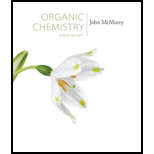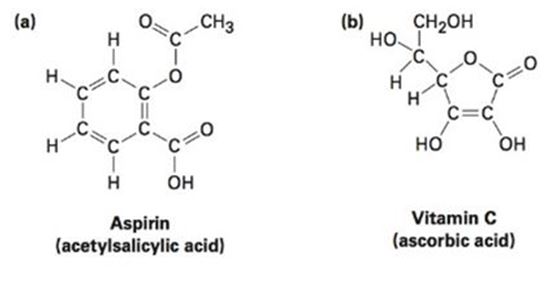
Organic Chemistry
9th Edition
ISBN: 9781305080485
Author: John E. McMurry
Publisher: Cengage Learning
expand_more
expand_more
format_list_bulleted
Concept explainers
Textbook Question
Chapter 1.SE, Problem 29AP
Convert the following line-bond structures into molecular formulas:

Expert Solution & Answer
Trending nowThis is a popular solution!

Students have asked these similar questions
Draw the line-bond structure formula of the following:
Following is a structural formula of the prescription drug famotidine, marketed by McNeil Consumer Pharmaceuticals Co. under the name Pepcid. The primary clinical use of Pepcid is for the treatment of active duodenal ulcers and benign gastric ulcers. Pepcid is a competitive inhibitor of histamine H2 receptors that reduces both gastric acid concentration and the volume of gastric secretions.
Q. Complete the Lewis structure of famotidine showing all valence electrons and any formal positive or negative charges.
Consider the molecule with the formula below, where X is the only central atom (all other
atoms are directly bonded to X). Draw the most important Lewis structure for the molecule
that follows the octet rule using the molecular charge and formal charges listed below.
Determine the identity of X and the number of single and double bonds in your structure.
Molecule formula: HXO2
Molecular charge: -1
Total number of valence electrons: 18
Formal charge on X: 0
The central atom (X) is:
Click for List
The molecule's number of single bonds is:
The molecule's number of double bonds is:
Click for List
Click for List
Chapter 1 Solutions
Organic Chemistry
Ch. 1.3 - Give the ground-state electron configuration for...Ch. 1.3 - How many electrons does each of the following...Ch. 1.4 - Prob. 3PCh. 1.4 - Convert the following representation of ethane,...Ch. 1.4 - What are likely formulas for the following...Ch. 1.4 - Prob. 6PCh. 1.4 - Prob. 7PCh. 1.7 - Draw a line-bond structure for propane, CH3CH2CH3....Ch. 1.7 - Convert the following molecular model of hexane, a...Ch. 1.8 - Draw a line-bond structure for propene, CH3CH=CH2....
Ch. 1.8 - Draw a line-bond structure for 1, 3-butadiene,...Ch. 1.8 - Following is a molecular model of aspirin...Ch. 1.9 - Draw a line-bond structure for propyne, CH3C≡CH....Ch. 1.10 - Prob. 14PCh. 1.12 - Prob. 15PCh. 1.12 - Prob. 16PCh. 1.12 - The following molecular model is a representation...Ch. 1.SE - Convert each of the following molecular models...Ch. 1.SE - The following model is a representation of citric...Ch. 1.SE - The following model is a representation of...Ch. 1.SE - The following model is a representation of...Ch. 1.SE - How many valence electrons does each of the...Ch. 1.SE - Give the ground-state electron configuration for...Ch. 1.SE - Prob. 24APCh. 1.SE - Prob. 25APCh. 1.SE - Draw an electron-dot structure for acetonitrile,...Ch. 1.SE - Draw a line-bond structure for vinyl chloride,...Ch. 1.SE - Fill in any nonbonding valence electrons that are...Ch. 1.SE - Convert the following line-bond structures into...Ch. 1.SE - Convert the following molecular formulas into...Ch. 1.SE - Prob. 31APCh. 1.SE - Oxaloacetic acid, an important intermediate in...Ch. 1.SE - Prob. 33APCh. 1.SE - Potassium methoxide, KOCH3, contains both covalent...Ch. 1.SE - What is the hybridization of each carbon atom in...Ch. 1.SE - Prob. 36APCh. 1.SE - Prob. 37APCh. 1.SE - What bond angles do you expect for each of the...Ch. 1.SE - Propose structures for molecules that meet the...Ch. 1.SE - What kind of hybridization do you expect for each...Ch. 1.SE - Pyridoxal phosphate, a close relative of vitamin...Ch. 1.SE - Prob. 42APCh. 1.SE - Prob. 43APCh. 1.SE - Quetiapine, marketed as Seroquel, is a heavily...Ch. 1.SE - Tell the number of hydrogens bonded to each carbon...Ch. 1.SE - Why do you suppose no one has ever been able to...Ch. 1.SE - Allene, H2C=C=CH2, is somewhat unusual in that it...Ch. 1.SE - Allene (see Problem 1-47) is structurally related...Ch. 1.SE - Complete the electron-dot structure of caffeine,...Ch. 1.SE - Most stable organic species have tetravalent...Ch. 1.SE - A carbanion is a species that contains a...Ch. 1.SE - Divalent carbon species called carbenes are...Ch. 1.SE - There are two different substances with the...Ch. 1.SE - There are two different substances with the...Ch. 1.SE - There are two different substances with the...Ch. 1.SE - Prob. 56APCh. 1.SE - Among the most common over-the-counter drugs you...
Knowledge Booster
Learn more about
Need a deep-dive on the concept behind this application? Look no further. Learn more about this topic, chemistry and related others by exploring similar questions and additional content below.Similar questions
- Draw the structure, determine the formal charge of all atoms, determine molecular polarity and draw the resonance structure of the following molecule:arrow_forwardCalculate the formal charge for each atom in the following HCOO- ion. H: C: O (single bond) : O (double bond) :arrow_forwardDrawing resonance structures shows ways a molecule vibrates back and forth between two differnt bond-line structures. True Falsearrow_forward
- Vitamin B6 is an organic compound whose deficiency in the human body can cause apathy, irritability, and an increased susceptibility to infections. Below is an incomplete Lewis structure for vitamin B6. Complete the Lewis structure and answer the following questions. Hint: Vitamin B6 can be classified as an organic compound (a compound based on carbon atoms). The majority of Lewis structures for simple organic compounds have all atoms with a formal charge of zero. Therefore, add lone pairs and multiple bonds to the structure below to give each atom a formal charge of zero. a. How many bonds and bonds exist in vitamin B6? b. Give approximate values for the bond angles marked a through g in the structure. c. How many carbon atoms are sp2 hybridized? d. How many carbon, oxygen, and nitrogen atoms are sp3 hybridized? e. Does vitamin B6 exhibit delocalized bonding? Explain.arrow_forwardMethylcyanoacrylate is the active ingredient in super glues. Its Lewis structure is (a) Give values for the three bond angles indicated. (b) Indicate the most polar bond in the molecule. (c) Circle the shortest carbon-oxygen bond. (d) Circle the shortest carbon-carbon bond.arrow_forwardAspartame is an artificial sweetener marketed under the name Nutra-Sweet. A partial Lewis structure for aspartame is shown below. Aspartame can be classified as an organic compound (a compound based on carbon atoms). The majority of Lewis structures for simple organic compounds have all atoms with a formal charge of zero. Therefore, add lone pairs and multiple bonds to the structure above to give each atom a formal charge of zero when drawing the Lewis structure. Also note that the six-sided ring is shorthand notation for a benzene ring (C6H5). Benzene is discussed in Section 4-7. Complete the Lewis structure for aspartame. How many C and N atoms exhibit sp1 hybridization? How many C and O atoms exhibit sp3 hybridization? How many and bonds are in aspartame?arrow_forward
- which of the following statement is not true? 1)Nitrogen s relative inertness is due to formation of strong and stable bond between 2 nitrogens atom. 2)the bond energy of N2 is relatively higher that makes it relatively inert. 3)the bond energy of an O-H bond is always the same in all compounds that contain an O-H bond 4)carbon-carbon single bond is the longest among all sorts of carbon-carbon bonds 5)a shorter bond in general ,is a stronger bond than a longer bondarrow_forwardMolecule #7 BrF4* Calculate the number of valence electrons Draw the three-dimensional structure of the molecule using the "wedge and dash" notation. Our logic for this choice is: The formal charge on F is Estimate F-Br-F bond angle Calculate the number of valence electrons Draw the three-dimensional structure of the molecule using the "wedge and dash" notation. Our logic for this choice is: Draw the Lewis Structure below The molecular geometry is: This molecule is polar nonpolar (Circle your choice.) The formal charge on Br is The hybridization of Br is Molecule #8 XeOF4 Draw the Lewis Structure below The molecular geometry is: This molecule is polar nonpolar (Circle your choice.) The formal charge on Xe is The hybridization of Xe is The formal charge on O is Estimate F-Xe-F bond anglearrow_forwardThe structure shown below is missing both its formal charges and lone pairs. Which of the choices correctly depicts the bond-line structure of this compound with correct formal charges? Incorrect Structure NEN NENO V=ル® NEN NENarrow_forward
- Chrysene is an aromatic hydrocarbon found in coal tar. Convert the molecular model to a Lewis structure in which all of the rings correspond to Kekulé formulas of benzene.arrow_forwardA o The bond line formula, represents the molecular formula C7H8 B C7H12arrow_forwardHow many different structural isomers are there for octahedral molecules with the general formula AX2Y3 if A is the inner atom and there are no X-Y, X-X and Y-Y bonds?arrow_forward
arrow_back_ios
SEE MORE QUESTIONS
arrow_forward_ios
Recommended textbooks for you
 Chemistry: The Molecular ScienceChemistryISBN:9781285199047Author:John W. Moore, Conrad L. StanitskiPublisher:Cengage Learning
Chemistry: The Molecular ScienceChemistryISBN:9781285199047Author:John W. Moore, Conrad L. StanitskiPublisher:Cengage Learning Introductory Chemistry: An Active Learning Approa...ChemistryISBN:9781305079250Author:Mark S. Cracolice, Ed PetersPublisher:Cengage Learning
Introductory Chemistry: An Active Learning Approa...ChemistryISBN:9781305079250Author:Mark S. Cracolice, Ed PetersPublisher:Cengage Learning Chemistry: Principles and PracticeChemistryISBN:9780534420123Author:Daniel L. Reger, Scott R. Goode, David W. Ball, Edward MercerPublisher:Cengage Learning
Chemistry: Principles and PracticeChemistryISBN:9780534420123Author:Daniel L. Reger, Scott R. Goode, David W. Ball, Edward MercerPublisher:Cengage Learning Introduction to General, Organic and BiochemistryChemistryISBN:9781285869759Author:Frederick A. Bettelheim, William H. Brown, Mary K. Campbell, Shawn O. Farrell, Omar TorresPublisher:Cengage Learning
Introduction to General, Organic and BiochemistryChemistryISBN:9781285869759Author:Frederick A. Bettelheim, William H. Brown, Mary K. Campbell, Shawn O. Farrell, Omar TorresPublisher:Cengage Learning
 Chemistry: An Atoms First ApproachChemistryISBN:9781305079243Author:Steven S. Zumdahl, Susan A. ZumdahlPublisher:Cengage Learning
Chemistry: An Atoms First ApproachChemistryISBN:9781305079243Author:Steven S. Zumdahl, Susan A. ZumdahlPublisher:Cengage Learning

Chemistry: The Molecular Science
Chemistry
ISBN:9781285199047
Author:John W. Moore, Conrad L. Stanitski
Publisher:Cengage Learning

Introductory Chemistry: An Active Learning Approa...
Chemistry
ISBN:9781305079250
Author:Mark S. Cracolice, Ed Peters
Publisher:Cengage Learning

Chemistry: Principles and Practice
Chemistry
ISBN:9780534420123
Author:Daniel L. Reger, Scott R. Goode, David W. Ball, Edward Mercer
Publisher:Cengage Learning

Introduction to General, Organic and Biochemistry
Chemistry
ISBN:9781285869759
Author:Frederick A. Bettelheim, William H. Brown, Mary K. Campbell, Shawn O. Farrell, Omar Torres
Publisher:Cengage Learning


Chemistry: An Atoms First Approach
Chemistry
ISBN:9781305079243
Author:Steven S. Zumdahl, Susan A. Zumdahl
Publisher:Cengage Learning
INTRODUCTION TO MOLECULAR QUANTUM MECHANICS -Valence bond theory - 1; Author: AGK Chemistry;https://www.youtube.com/watch?v=U8kPBPqDIwM;License: Standard YouTube License, CC-BY